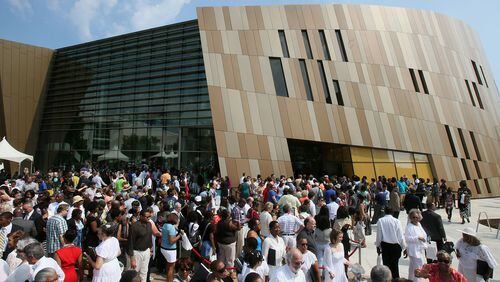After touring the newly open National Center for Civil and Human Rights, U.S. Rep. John Lewis said he was reminded of advice from Dr. Martin Luther King Jr.'s father.
“‘Make it plain son,’” Lewis recalled Martin Luther King Sr. saying.
“And this center makes it plain,” Lewis continued. The one-time Freedom Rider and Student Nonviolent Coordinating Committee chairman said people who visit will leave feeling moved “and maybe shedding just a few tears.”
Lewis, whose own civil rights legacy is documented inside the museum, was among at least hundreds who gathered in Monday’s sweltering heat to celebrate the opening of the $75 million center.
Former mayor Shirley Franklin, who, along with museum CEO Doug Shipman, is largely credited with bringing the center to life, said it seeks to connect America’s Civil Rights Movement with the global human rights struggle.
Franklin said the center explores “tough topics” of ugliness and hatred, but also hope.
“We learn about (these stories) through word of mouth, history and celebrations,” Franklin said. “And now we have a place you can visit … starting with the Atlanta story and spreading out to the global story.”
Shipman said “people working for freedom see the Civil Rights Movement as a road map and Atlanta as an example.”
The center — located near the World of Coca-Cola and Georgia Aquarium — was more than a decade in the making.
Joseph Lowery, a civil rights icon and former president of the Southern Christian Leadership Conference, and his late wife Evelyn first approached then-mayor Franklin in the early 2000s with a wish list for the project.
Franklin dedicated opening day to Evelyn Lowery, who died last fall.
“I wasn’t thinking about civil and human rights. I was thinking about water and sewer and potholes,” Franklin said. “She lifted me out of that place and said Atlanta has a role to play in the 21st century.”
Republican U.S. Sen. Johnny Isakson said the history of Atlanta and America is intertwined with civil and human rights. He called the center a testimony to Ambassador Andrew Young and Franklin’s dream of commemorating Atlanta’s role in civil rights history.
Mayor Kasim Reed said the center should serve as a “deep abiding and personal thank you to individuals known and unknown who helped and gave a hand so that their work and sacrifice is never ever taken for granted.”
Former Atlanta City Council President Lisa Borders, an executive with center supporter Coca-Cola, also addressed the crowd. A host of Atlanta politicos and business executives attended the event on the museum’s lawn near Centennial Olympic Park, among them U.S. Senate Democratic hopeful Michelle Nunn and several Atlanta City Council members.
The 42,000 square foot museum features exhibitions and artifacts, including the King papers (on loan from Morehouse College); seven portraits of human rights “heroes” by Atlanta painter Ross Rossin; a series of paintings of Lewis by folk artist Benny Andrews; “Without Sanctuary,” images and postcards of lynchings in America collected by James Allen.
Exhibition designer David Rockwell said the museum explores themes of participation and choice.
“In a lifetime as an architect, you don’t often get the opportunity to make a difference and celebrate the people who changed the course of the world,” he said.
About the Author






